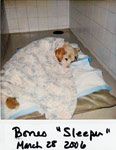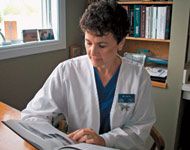An old dog's last stand
Love for a feeble, weathered Labrador came quickly for this veterinarian.
He looked like a skeleton so I named him Bones. My team members and I gave him a padded bed and wrapped him in a comforter while we started our laboratory tests to learn more about him.

(Photo courtesy of Dr. Ruth Barthel)
The old dog had collapsed by the side of the road, so weak he couldn't lift his head. A kind woman found him and brought him to my hospital. My first thought was "Oh, you poor dog," and the second was the sad realization that I'd probably have to euthanize him out of kindness.
He was truly skin and bones, weighing 40 pounds when he should have weighed 75. These are the statistics I put in his chart: older intact male, yellow coat, breed most likely Labrador, no collar or microchip, cataracts, grade 4 periodontal disease, multiple warts, grade 2 heart murmur with no evidence of heart failure, arthritis likely in left elbow and both hips, unable to stand, aware of surroundings but dull mental attitude.
Tests were negative for heartworm infection, intestinal parasites, and major liver and kidney dysfunction. Based on these results, I presumed he was owned by a caring family. The only way he could have been heartworm-negative in Michigan was if he'd been consistently receiving preventive pills. I had visions of Bones out in the cold, starving to death for the past month. Someone must be looking for him—or heartbroken that he had wandered off. I couldn't euthanize him without trying to give the owner a chance to say goodbye.
Bones ate voraciously. We started small and gradually increased the size of his meals over the next few days. He ate best if we hand-fed him.
We called all the surrounding shelters and humane societies to report Bones, and one lost-dog message fit his description. That dog had gone missing more than a month before in the same part of the county where Bones was found. We left a message at the provided number, hoping to reunite Bones with his owner. Days passed and no one called.
Lost dog finds a foster mom: me
Bones gained enough strength to stand as long as someone held him around his tiny waist. He'd never urinate on his bed; he waited to be taken outside to the grass. His courage had all of us falling in love with him.
Although he gained two pounds in four days, it was obvious this would be a long convalescence. Bones wasn't going to be a dog we could find a home for anytime soon, if ever. But I couldn't bear to put him to sleep. It was spring break, so maybe the owner was away and hadn't gotten our message.
I wasn't sure Bones would recuperate, but the least he deserved was food, warmth, and someone to love him. So I took him home. After 25 years in practice, I'd learned not to take home every stray that crossed the hospital's threshold, but I couldn't resist Bones. During the day he lived at the hospital so we could feed him, carry him out to the grass, and carry him back in to sleep. At night he slept on my couch while I sat next to him and watched HBO. My own dog was a bit perturbed by this. He sat on the other side of me, which meant my husband had to sit elsewhere—the couch is only so big.
A miss and a hit
Finally, seven days after Bones had shown up at our clinic, someone left a message on our answering machine: "You called to say you might have my dog, but I already found my dog. Thanks for calling, though." We were devastated. Whoever owned Bones had probably given up on checking the lost-dog ads. The local paper agreed to run a story on him the next week.
The next day Bones wouldn't eat. He had some diarrhea and seemed weaker. I didn't think he'd last long enough for the newspaper story to run, so we called two local radio stations. The stations agreed that this was a special case and said they'd make an announcement.
An hour before closing time, I heard my receptionist saying, "Yes, he's an old yellow lab, very thin. Can you come right over?" We couldn't wait to reunite Bones with his owner! There was a concern, though. The owner said Bones had been lost for only a few days—the same number of days that we'd cared for him. This dog didn't become emaciated while he was lost! Did I really want to give him back?
A younger woman and a man with a short grey beard came in. The woman was the man's neighbor, and she'd heard the radio announcement. My receptionist told the man which road Bones had been found on, and the man exclaimed, "The lady must have picked him up from my front yard! I thought he'd crawled away to die."
A man and his dog
I was finishing an appointment and told my assistant not to take Bones up to the front just yet. I hadn't decided whether to return him to this potentially neglectful owner. But I found out the man had been struggling with the idea of euthanizing his dog. He knew it was time, but he couldn't bear to do it. He said he appreciated all we'd done for Bones and he was now ready to let him go.
This man obviously loved Bones. We brought the tired old dog out on a stretcher, lying on his padded bed and wrapped in his comforter. Bones, who could barely walk and had never wagged his tail for us, looked up and wagged his tail. The man started crying and wrapped his arms around his dog. He had his final conversation with Bones and then nodded to me. My last caring act was to send Bones to his rest while in his owner's loving arms.
Bones' real name was Sleeper—he'd been diagnosed with narcolepsy at a young age. He was born in his owner's basement, one of a litter of nine pups. He was the last of that litter alive. Six years ago, Sleeper had sired pups of his own, one of which the man had kept.
Sleeper's daily routine was to walk to the neighbor's house for a treat. It took him a while, but he eventually got there. Perhaps he had fallen asleep by the side of the road during this daily journey just before he was picked up and brought to us. We'll never know. But we do know that we made a man and a dog very happy to be reunited. I cried when I said goodbye to Sleeper. I miss him even though I was only with him seven days. Sleeper died surrounded by love. He was 17 years old.
About the author
Dr. Ruth Barthel is owner of Grass Lake Animal Hospital, a one-doctor small animal Âhospital in Grass Lake, Mich.

Ruth Barthel, DVM (Photos courtesy of Dr. Ruth Barthel)